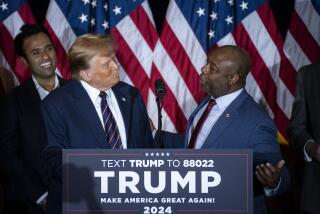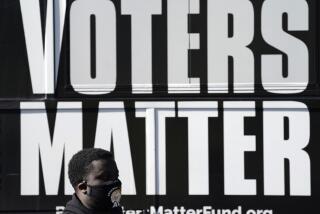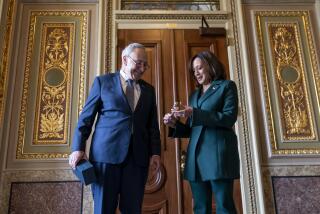Kamala Harris and Cory Booker embrace new era for black candidates post-Obama
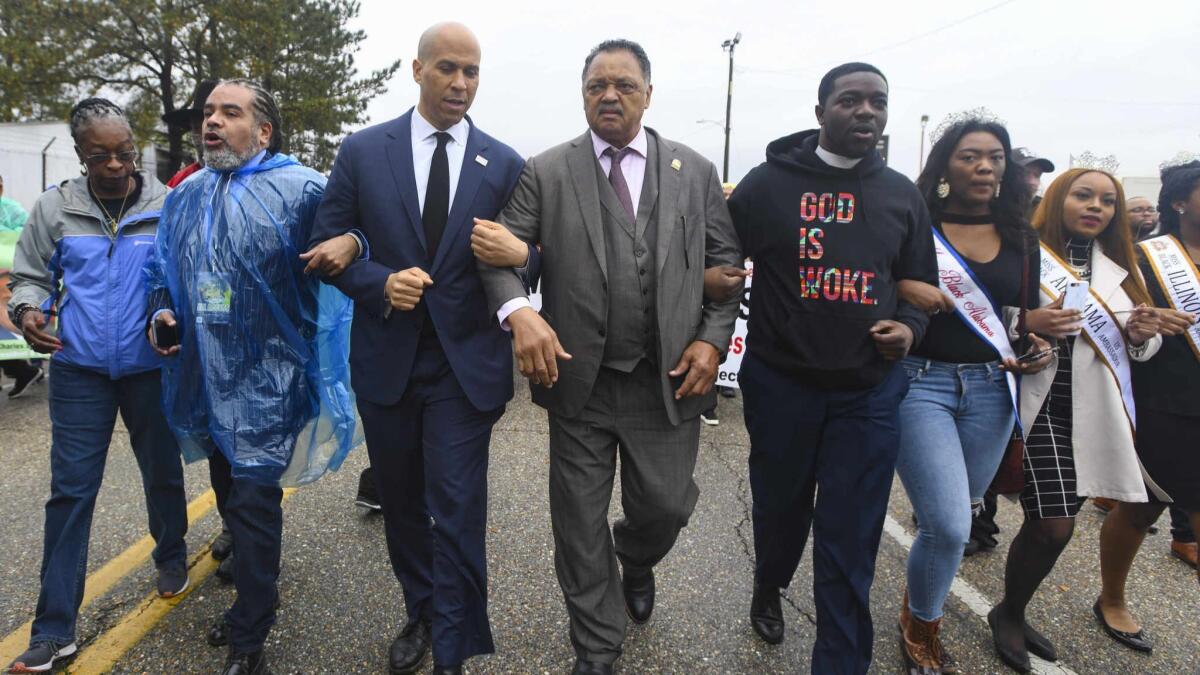
Cory Booker talks frankly about racism as he campaigns, pointing out how the “dark spirit of bigotry” was part of the nation’s founding and urging crowds to speak the truth about prejudice.
Kamala Harris bluntly tells supporters that racism is a potent force in society, saying that Americans have for too long avoided confronting the “awful, shameless history on race in this country.”
In 2019, more than a decade after the nation made history by electing its first black president, and halfway through the term of a president whose words and actions have drawn accusations of racism, the two Democrats are redefining the idea of what it means to be a black presidential candidate.
In their tone, their words, where they travel and which audiences they choose, the U.S. senators have embraced their black identities and followers in ways unprecedented for mainstream presidential hopefuls.
They stand in stark contrast to Barack Obama, who in his early 2008 campaign avoided talking about his race to the point that the biracial Illinois senator was awkwardly asked on national television when he “decided” to be black.
“After Barack Obama, they are facing voters that want more than symbols when it comes to race,” said Vincent Hutchings, a political science and African American studies professor at the University of Michigan.
Obama, of course, was not merely a symbol to his legions of supporters. But while questions of race were thrust upon him, often amid controversy, Booker and Harris instead tend to broach the subject themselves.
“As a black person trying to become president, it’s a difficult terrain to travel that is bound up in questions about your background, history and policies,” Hutchings said. “They are talking about race more and doing it in more specific terms.”
Booker and Harris have forcefully called out President Trump — suggesting he’s racist or outright saying it. In speeches and interviews, they tackle questions of slavery reparations, white supremacy, the toll of mass incarceration of young black men and the drug war on black families. They do it on Black Entertainment Television, on black-run radio shows, at famed sites of the civil rights era in the South and at historically black colleges and universities.
It’s not only these Democrats who make bold declarations about race on the trail. Former Texas Rep. Beto O’Rourke bemoans the “racist capitalist economy.” Massachusetts Sen. Elizabeth Warren has called for a national “full-blown conversation on reparations.” Vermont Sen. Bernie Sanders reminds crowds during speeches that “racism is alive.”
But candid talk about race has always been a risky calculation for those who aren’t white — and it’s especially so for black people, be it in the corporate office or on the presidential campaign trail.
“African American candidates had always been treated as African American candidates, as opposed to contenders, and we didn’t want to get shoved into that box,” said David Axelrod, Obama’s longtime political advisor, referring to the former president’s first White House bid.
But today, obviously, Booker and Harris don’t need to prove that a black candidate can be elected president.
Obama’s victory followed on the path-breaking efforts of other black candidates. In 1972, New York Rep. Shirley Chisholm, in a longshot bid, became the first major African American Democrat to seek the White House. In the 1980s, the Rev. Jesse Jackson, a product of the civil rights movement, waged a pair of unsuccessful tries for president.
Unlike those two — and, for that matter, black Republicans Herman Cain in 2012 and Ben Carson in 2016 — Harris and Booker are seen by pundits as top-tier contenders with more serious prospects of becoming president.
While Democrats’ overtures to black voters — a vital part of the party’s base — are routine, the two campaigns’ efforts are also a response to changing public perceptions around race and widespread opposition among racial minorities to the Trump administration.
Polls have shown Americans increasingly see racism as a major problem. A Gallup survey released this year found that among all Americans, just 30% said they were “very” or “somewhat” satisfied about race relations in the country. Worse, just 18% of blacks said they were satisfied with how they’re treated — down from 32% in 2016. Trump’s approval rating among blacks has been at record lows for a president.
Booker and Harris are betting that a wide variety of Democratic primary voters, tired and angry after two years of a president whom civil rights groups have routinely denounced for stoking racial tensions, will be energized by declarations of black racial pride.
Their biographies — Harris, the biracial daughter of immigrants who made her name as a Bay Area prosecutor, and Booker, the son of black executives who became nationally known as mayor of Newark, N.J. — have shaped the campaigns when it comes to race and how interviewers, pundits and town hall attendees have approached them.
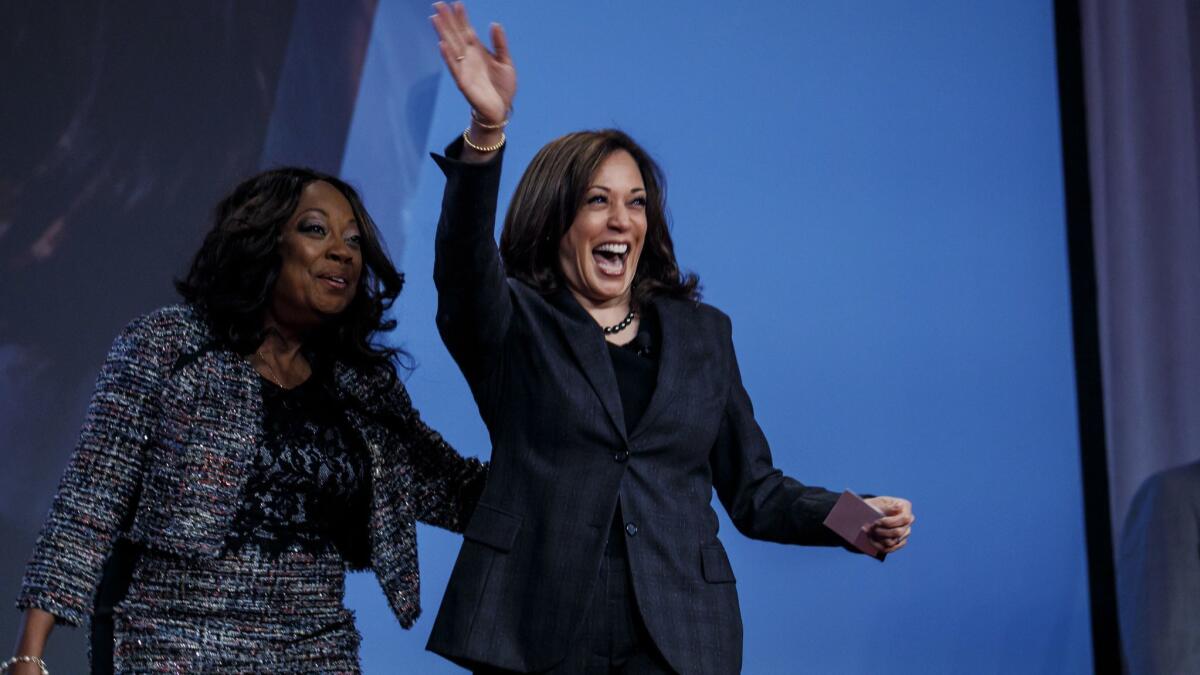
“For Booker, it’s a question of class authenticity. For someone who grew up solidly upper-middle-class, is he relatable across the spectrum of the African American community?” said the Rev. Derrick Harkins, a former Obama campaign advisor who has also led faith outreach for the Democratic National Committee.
“For Harris, she has been attacked for her biracial background, a line that I don’t think will last. But she has also had to defend herself for being prosecutor and attorney general in time when African Americans’ long-standing complaints about inequality in criminal justice have turned into a reform movement,” Harkins said.
Booker, 49, was born in Washington, D.C., and raised in suburban New Jersey by parents who worked for IBM. Harris, 54, was born in Oakland to an Indian mother who was a cancer researcher and a Jamaican father who was an economist. She grew up in Berkeley and later Montreal.
Booker often recounts his parents’ experience with housing discrimination. It was 1969, and they were told a house they wanted to buy in a white New Jersey neighborhood wasn’t on the market. They enlisted a white couple to put in a bid, and Booker’s parents showed up with a white volunteer lawyer to close the sale.
He’s connected that story to a larger theme of unity and fairness across divides, including racial ones. Speaking recently in Manchester, N.H., Booker called for “a revival of civic grace” by invoking “that old African saying that if you want to go fast, go alone, but if you want to go far, go together.”
Harris also often talks of her parents, who met as graduate students during the civil rights movement and gave her a “strollers-eye view” of the fight for racial equality. In her autobiography, “The Truths We Hold,” she wrote about her mother raising her daughters to grow into “confident, proud black women.”
During her campaign launch in Oakland, she referenced Frederick Douglass, Harriet Tubman and the Rev. Martin Luther King Jr., and quoted lyrics from reggae icon Bob Marley. She’s cited her sisters in Alpha Kappa Alpha, a black women’s sorority, as key to her young adulthood.
While telling their stories, Booker and Harris have had to confront questions about race head-on. In some ways, they echo those faced by Obama, whose part-Kenyan background and rearing by his white mother in Hawaii and Indonesia were distant from the experiences of most black Americans.
For Booker, who graduated with a law degree from Yale and moved into a subsidized housing complex in Newark after his 1998 City Council election, accusations of being an elite impostor using a poor black city to further his career dogged his early political life.
When he first ran for mayor of the majority-black city in 2002, the longtime black incumbent who beat him accused Booker of not being “black enough.”
Harris, meanwhile, faced less overt questions about her racial identity as she rose through California’s political ranks. Since emerging as a top-tier presidential candidate, however, her life has been dissected beneath a microscope — her marriage to a white man, her professed love of Tupac and Snoop Dogg, her sprinkling of hot sauce on greens at a South Carolina barbecue restaurant.
One of Harris’ biggest selling points — her tenure as San Francisco district attorney and California attorney general — has also been roundly scrutinized. She touts herself as a “progressive prosecutor” who reduced mass incarceration by increasing programs to re-route criminals to rehabilitation outside prison. But critics have accused her of endorsing a belief that a criminal system in which black people are disproportionately imprisoned could best be fixed from the inside instead of reimagining it wholesale.
Voters have noticed the way race is playing out in the campaign.
Mark Colston, a Walmart manager from Wilson, N.C., spent a few hours of his Las Vegas vacation recently to attend a Booker campaign town hall. He said he first heard of Booker after watching the film “Street Fight,” which documented his brutal first mayoral race.
“It’s unfair,” said Colston, who is black. “Just because someone didn’t grow up in the inner city doesn’t mean they’re not connected to the community.”
Simeon Talley, who was a field organizer for Obama in Iowa and now runs a politics podcast, interviewed Harris in Cedar Rapids recently after noticing cable analysts questioning the “legitimacy” of her black identity. He asked what she learned from watching Obama navigate similar critiques.
Harris replied that the question of Obama being “black enough” was a “ridiculous conversation” premised on a limited notion of what it meant to be black.
“I think we’re in a much different place now than we were then,” Talley, who is black, later said in an interview. “We’ve had a black president. We’re much more familiar with black candidates, and even women of color running for office.”
Times staff writers Mark Z. Barabak and Michael Finnegan contributed to this report.
More to Read
Get the L.A. Times Politics newsletter
Deeply reported insights into legislation, politics and policy from Sacramento, Washington and beyond. In your inbox three times per week.
You may occasionally receive promotional content from the Los Angeles Times.
